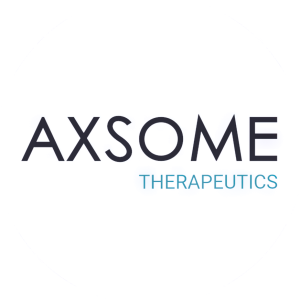Axsome Therapeutics Completes U.S. Acquisition of Sunosi® (solriamfetol) for Excessive Daytime Sleepiness Associated with Narcolepsy or Obstructive Sleep Apnea
Rhea-AI Summary
Axsome Therapeutics has completed its acquisition of Sunosi from Jazz Pharmaceuticals, marking a significant shift towards becoming a commercial neuroscience company. Sunosi, a dual-acting dopamine and norepinephrine reuptake inhibitor, is FDA-approved for improving wakefulness in adults with excessive daytime sleepiness due to narcolepsy or obstructive sleep apnea. The drug boasts 96% insurance coverage, providing access to approximately 253 million lives. In clinical trials, Sunosi demonstrated significant efficacy in reducing daytime sleepiness and increasing wakefulness.
Positive
- Acquisition of Sunosi enhances Axsome's portfolio in CNS therapies.
- 96% insurance coverage provides access to approximately 253 million lives.
- Sunosi has demonstrated significant efficacy in clinical trials for narcolepsy and OSA.
Negative
- Acquisition costs and integration challenges may strain financial resources.
- Sunosi does not address the underlying cause of obstructive sleep apnea.
News Market Reaction 1 Alert
On the day this news was published, AXSM declined 10.06%, reflecting a significant negative market reaction.
Data tracked by StockTitan Argus on the day of publication.
Axsome is committed to providing patients uninterrupted access to Sunosi and advancing research for patients living with sleep disorders
Insurance coverage for Sunosi totals
Comprehensive patient assistance program for Sunosi provides affordable access for all appropriate patients
Sunosi is the first and only dual-acting dopamine and norepinephrine reuptake inhibitor (DNRI) approved by the FDA to treat excessive daytime sleepiness associated with narcolepsy or obstructive sleep apnea
Investor webcast planned
NEW YORK, May 09, 2022 (GLOBE NEWSWIRE) -- Axsome Therapeutics, Inc. (NASDAQ: AXSM), a biopharmaceutical company developing novel therapies for the management of central nervous system (CNS) disorders, today announced the completion of its U.S. acquisition of Sunosi® (solriamfetol) from Jazz Pharmaceuticals (NASDAQ: JAZZ). Sunosi is a dual-acting dopamine and norepinephrine reuptake inhibitor (DNRI) indicated to improve wakefulness in adult patients with excessive daytime sleepiness (EDS) due to narcolepsy or obstructive sleep apnea (OSA). The ex-U.S. transaction is expected to close within 60 days.
Experience the interactive Multimedia News Release here: https://www.multivu.com/players/English/9034851-axsome-therapeutics-completes-us-acquisition-sunosi-solriamfetol/
“Excessive daytime sleepiness is one of the main presenting symptoms of obstructive sleep apnea, persists in
“In several clinical trials, Sunosi has demonstrated significant efficacy in both subjective and objective measures of sleepiness in adults with narcolepsy and obstructive sleep apnea, with large effect sizes,” said Richard K. Bogan, MD, FCCP, FAASM, Associate Clinical Professor at the University of South Carolina School of Medicine in Columbia, SC, and Associate Clinical Professor at Medical University of South Carolina in Charleston, SC. “Sunosi is an important treatment for patients living with these conditions. The effect of excessive daytime sleepiness on individuals with narcolepsy and obstructive sleep apnea includes functional impairment, reduced quality of life, and increased risk for occupational and motor vehicle accidents.”
Sunosi was approved by the U.S. Food and Drug Administration (FDA) in 2019 and by the European Medicines Agency (EMA) in 2020 based on data from randomized placebo-controlled studies in patients with EDS associated with narcolepsy or OSA that demonstrated the superiority of Sunosi relative to placebo.
Sunosi should not be used in patients who are taking, or have stopped taking within the past 14 days, a medicine used to treat depression called a monoamine oxidase inhibitor (MAOI). The most common adverse reactions (incidence ≥
Although the exact mechanism of action is unknown, the effects of Sunosi are thought to be mediated through its activity as a DNRI. Sunosi is the first and only DNRI approved by the FDA to treat EDS in adults living with narcolepsy or OSA.
Sunosi does not treat the underlying cause of airway obstruction in people with OSA and does not take the place of using a continuous positive airway pressure (CPAP) machine or other devices for the treatment of OSA. It is important to continue to use these treatments during treatment with Sunosi.
“We are proud to provide narcolepsy and obstructive sleep apnea patients with excessive daytime sleepiness continued access to Sunosi, and we intend to further research of this important medicine in other clinical settings,” said Herriot Tabuteau, MD, Chief Executive Officer of Axsome. “The Sunosi acquisition marks the transformation of Axsome into a commercial neuroscience company, and reflects our commitment to the millions of people living with serious neurologic and psychiatric conditions.”
Broad Insurance Coverage and Affordable Access
The commercial insurance coverage for Sunosi currently totals
Axsome recognizes the importance of providing patients with EDS associated with narcolepsy and OSA affordable access to Sunosi. As such, Axsome is proud to offer a comprehensive patient affordability program that reduces barriers to access for appropriate patients. For eligibility requirements and to enroll in the patient support program, patients can visit www.sunosi.com.
Efficacy in EDS Associated with Narcolepsy
In a 12-week randomized, multi-center, double-blind, placebo-controlled trial in adult patients with narcolepsy (N=239), Sunosi 150 mg (n=55) was shown to deliver significant improvements across three key clinical measures vs. placebo (n=58).1-3
- Up to
22% reduction in daytime sleepiness, as measured by the Epworth Sleepiness Scale, compared to a5% reduction for placebo, at week 12 (Baseline/LS mean change: 17.0/-5.4 vs. 17.3/-1.6, respectively; p<0.0001)3 - Up to
118% additional minutes of wakefulness with Sunosi, as measured by the Maintenance of Wakefulness Test, compared to5% with placebo, at week 12 (LS mean change in minutes 9.8 vs. 2.1, respectively; p<0.0001)3 - Up to
78% of Sunosi-treated patients reported feeling better, as measured by the Patient Global Impression of Change scale, compared to40% with placebo, at week 12 (p<0.0001)2
Efficacy in EDS Associated with OSA
In a 12-week randomized, multi-center, double-blind, placebo-controlled trial in adult patients with EDS associated with OSA (N=459), Sunosi 150 mg (n=116) was shown to deliver significant improvements across three key clinical measures vs. placebo (n=114).1,3,4
- Up to
52% reduction in daytime sleepiness for Sunosi, as measured by the Epworth Sleepiness Scale, compared to a15% reduction for placebo, at week 12 (Baseline/LS mean change: 15.1/-7.7 vs. 15.6/-3.3; p<0.0001)3 - Up to
82% additional minutes of wakefulness for Sunosi, as measured by the Maintenance of Wakefulness Test, compared to0% with placebo, at week 12 (LS mean change in minutes 11.0 vs. 0.2, respectively; p<0.0001)3 - Up to
90% of Sunosi-treated patients reported feeling better, as measured by the Patient Global Impression of Change scale, compared to49% with placebo, at week 12 (p<0.0001)4
Investor Webcast Information
Axsome will host an investor webcast in the coming weeks to discuss the clinical landscape related to Sunosi, and to provide an overview of Sunosi commercial activities and development plans. Additional details and the precise date of the webcast will follow in a separate release.
About Sunosi® (solriamfetol)
Sunosi is a dual-acting dopamine and norepinephrine reuptake inhibitor shown to improve wakefulness in adults living with excessive daytime sleepiness (EDS) due to narcolepsy or obstructive sleep apnea (OSA). Sunosi received U.S. Food and Drug Administration approval on March 20, 2019 to improve wakefulness in adult patients with EDS associated with narcolepsy or OSA and was designated a Schedule IV medicine by the U.S. Drug Enforcement Agency on June 17, 2019. SK Biopharmaceuticals Co., Ltd., the discoverer of the compound, maintains rights in 12 Asian markets, including Korea, China and Japan. Sunosi has orphan drug designation for narcolepsy in the United States.
More information about Sunosi, including Full Prescribing Information and Medication Guide, is available here.
Important Safety Information
SUNOSI (solriamfetol) is available in 75 mg and 150 mg tablets and is a federally controlled substance (CIV) because it contains solriamfetol that can be a target for people who abuse prescription medicines or street drugs. Keep SUNOSI in a safe place to protect it from theft. Never give or sell your SUNOSI to anyone else because it may cause death or harm them and it is against the law. Tell your doctor if you have ever abused or been dependent on alcohol, prescription medicines, or street drugs.
Before taking SUNOSI, tell your doctor about all of your medical conditions, including if you:
- have heart problems, high blood pressure, kidney problems, diabetes, or high cholesterol.
- have had a heart attack or a stroke.
- have a history of mental health problems (including psychosis and bipolar disorders), or of drug or alcohol abuse or addiction.
- are pregnant or planning to become pregnant. It is not known if SUNOSI will harm your unborn baby.
- are breastfeeding or plan to breastfeed. It is not known if SUNOSI passes into your breast milk. Talk to your doctor about the best way to feed your baby if you take SUNOSI.
What are the possible side effects of SUNOSI?
SUNOSI may cause serious side effects, including:
- Increased blood pressure and heart rate. SUNOSI can cause blood pressure and heart rate increases that can increase the risk of heart attack, stroke, heart failure, and death. Your doctor should check your blood pressure before, and during, treatment with SUNOSI. Your doctor may decrease your dose or tell you to stop taking SUNOSI if you develop high blood pressure that does not go away during treatment with SUNOSI.
- Mental (psychiatric) symptoms including anxiety, problems sleeping (insomnia), irritability, and agitation. Tell your doctor if you develop any of these symptoms. Your doctor may change your dose or tell you to stop taking SUNOSI if you develop side effects during treatment with SUNOSI.
The most common side effects of SUNOSI include:
- headache
- decreased appetite
- problems sleeping
- nausea
- anxiety
These are not all the possible side effects of SUNOSI. Call your doctor for advice about side effects.
You are encouraged to report negative side effects of prescription drugs to the FDA. Visit www.fda.gov/medwatch, or call 1-800-FDA-1088.
Please find full Prescribing Information here: https://sunosihcp.com/assets/files/sunosi-pi.pdf
SUN CON ISI 05/2022
About Obstructive Sleep Apnea and Excessive Daytime Sleepiness
Obstructive sleep apnea, commonly referred to as sleep apnea, is a highly prevalent disease (as high as
About Narcolepsy
Narcolepsy is a serious and debilitating neurological condition that causes dysregulation of the sleep-wake cycle and is characterized clinically by excessive daytime sleepiness, cataplexy, hypnagogic hallucinations, sleep paralysis, and disrupted nocturnal sleep. Narcolepsy afflicts an estimated 185,000 individuals in the U.S. Narcolepsy interferes with cognitive, psychological, and social functioning, increases the risk of work- and driving-related accidents, and is associated with a 1.5-fold higher mortality rate.
About Axsome Therapeutics, Inc.
Axsome Therapeutics, Inc. is a biopharmaceutical company developing and delivering novel therapies for central nervous system (CNS) conditions that have limited treatment options. Through development of therapeutic options with novel mechanisms of action, we are transforming the approach to treating CNS conditions. At Axsome, we are committed to developing products that meaningfully improve the lives of patients and provide new therapeutic options for physicians. For more information, please visit the Company’s website at axsome.com. The Company may occasionally disseminate material, nonpublic information on the company website.
Forward Looking Statements
Certain matters discussed in this press release are “forward-looking statements”. We may, in some cases, use terms such as “predicts,” “believes,” “potential,” “continue,” “estimates,” “anticipates,” “expects,” “plans,” “intends,” “may,” “could,” “might,” “will,” “should” or other words that convey uncertainty of future events or outcomes to identify these forward-looking statements. In particular, the Company’s statements regarding trends and potential future results are examples of such forward-looking statements. The forward-looking statements include risks and uncertainties, including, but not limited to, the continued commercial success of our newly acquired Sunosi product; the success, timing and cost of our ongoing clinical trials and anticipated clinical trials for our current product candidates, including statements regarding the timing of initiation, pace of enrollment and completion of the trials (including our ability to fully fund our disclosed clinical trials, which assumes no material changes to our currently projected expenses), futility analyses and receipt of interim results, which are not necessarily indicative of the final results of our ongoing clinical trials, and the number or type of studies or nature of results necessary to support the filing of a new drug application (“NDA”) for any of our current product candidates; our ability to fund additional clinical trials to continue the advancement of our product candidates; the timing of and our ability to obtain and maintain U.S. Food and Drug Administration (“FDA”) or other regulatory authority approval of, or other action with respect to, our product candidates (including, but not limited to, whether potential filing issues or issues identified by FDA during the substantive review may impact the potential approvability of the Company’s NDA submission for AXS-05 in MDD or the timing of such approval; whether issues identified by FDA in the complete response letter may impact the potential approvability of the Company’s NDA for AXS-07 for the acute treatment of migraine in adults with or without aura, pursuant to our special protocol assessment for the MOMENTUM clinical trial; the potential for the ASCEND clinical trial, combined with the GEMINI clinical trial results, to provide a basis for approval of AXS-05 for the treatment of major depressive disorder and accelerate its development timeline and commercial path to patients; the Company’s ability to successfully defend its intellectual property or obtain the necessary licenses at a cost acceptable to the Company, if at all; the successful implementation of the Company’s research and development programs and collaborations; the success of the Company’s license agreements; the acceptance by the market of the Company’s product candidates, if approved; the Company’s anticipated capital requirements, including the amount of capital required for the continued commercialization of Sunosi and for the Company’s commercial launch of its product candidates, and the potential impact on the Company’s anticipated cash runway; unforeseen circumstances or other disruptions to normal business operations arising from or related to COVID-19; and other factors, including general economic conditions and regulatory developments, not within the Company’s control. The factors discussed herein could cause actual results and developments to be materially different from those expressed in or implied by such statements. The forward-looking statements are made only as of the date of this press release and the Company undertakes no obligation to publicly update such forward-looking statements to reflect subsequent events or circumstance.
Axsome Contact:
Mark Jacobson
Chief Operating Officer
Axsome Therapeutics, Inc.
22 Cortlandt Street, 16th Floor
New York, NY 10007
Tel: 212-332-3243
Email: mjacobson@axsome.com
www.axsome.com
References
- SUNOSI (solriamfetol) [prescribing information]. 2021.
- Thorpy MJ, Shapiro C, Mayer G, et al. A randomized study of solriamfetol for excessive sleepiness in narcolepsy. Ann Neurol. 2019;85(3):359-370.
- Axsome Data on File.
- Schweitzer PK, Rosenberg R, Zammit GK, et al. Solriamfetol for excessive sleepiness in obstructive sleep apnea (TONES 3): a randomized controlled trial. Am J Respir Crit Care Med. 2019;199(11):1421-1431.
PP-SUN-US-2200114










